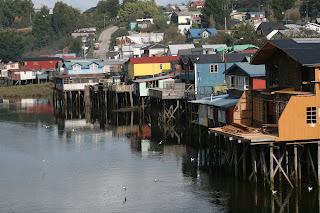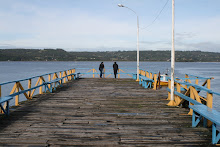Last tuesday night I hopped on a 14 hour bus south to enjoy the fruits, or shellfish rather, of Chiloé, South America's second largest island and a pleasant Chilean refuge. While the western/modern/McDonald's influence can be felt in msot of Chile, Chiloé serves as a traditional oasis. The island feels frozen in time, clouds, and endless green hills spotted with sheep. Fishing is the major occupation there while tourism brings in money in the summertime. However, the winters are cold and rainy and mostly ignored by tourists. While my travels in February were defined by the high season, this trip was a perfect example of the wonders of traveling without other tourists.

The first stop was the main city of Castro, the capital of the region renowned for the palafitos, houses built over the water on stilts. Chiloé was known for these houses but after the 1960 earthquake most were destroyed and the people of Castro were the only ones crazy enough to keep up this impractical style of living.


After a few days of exploring Castro and some more surrounding towns and islands we found ourselves in Quemchi, a small, pretty much one road town in the northern half of the island. El Chejo, the local restaurant was most definately the pearl of Quemchi. When we walked into the restaurant the owner was waiting to shake our hands and within a few minutes he had decided what we were going to eat: seafood emapanadas and salmon. All of a sudden while we were enjoying the food, the earth began to move. Everything shook and no one said a thing, shock and disbelief rattled inside our skulls, as the giant invisible locomotive drove through the wooden restaurant. My first tremor...I'm not in Connecticut anymore. The Chileans laughed at Molly and me and a few minutes later all the lights went out; when the tremors are strong enough they cut all the electricity in the region to avoid fires. We then spent the rest of the night in the kitchen with the owner and his wife talking about who knows what while tasting local liquors made from berries. Every topic was covered by the light of the candle and the wood stove. At one point he warned us of a prophecy that says the end of world will began when a black pope is elected. He then told us he was afraid of Barack Obama and that if he were president the world might end. I was about to tell him who I voted for in the primaries but I decided I would rather be served more of his liquour so I shut up and kept listening.
We planned on returning to Valpo Saturday night but Chile was struck by the heaviest rains in many years. Bridges in the regions between Chiloé and Valpo had collapsed due to swollen rivers and the buses were cancelled. Oh man, I can't get back to classes and I am stuck down here for more days than I had planned. Damn, how awful...
We stumbled into another wonderful evening in Puerto Montt, one of the most important cities economically in southern Chile. The hostal we wanted to stay in, Hostal Suizo, was closed and had a sign on the fence advising us to try the house next door, which turned out to be the owner's parents. While we were sitting down for some bread and ham (classic Chilean onces) the owner from next door entered and we began to chat. Rossy Oelckers is half Swiss, half Chilean, an artist, collector, hostal owner, storyteller, and an incredible host. We spent the evening touring her incredible home, full of her art and prized belongings and sharing stories over a bottle of Chilean red.
We left Puerto Montt happy for Valdivia. Valdivia is a slow paced fishing town to the north and was once an important Spanish colonial town. Everything was super tranquilo in the town and we spend most of the time watching the sea lions fight over fish scraps next to the market, which was breathtaking. Other highlights include the Kuntsmann Brewery, Indiana Jones and the Kingdom of the Crystal Skull, finding strange fruits in a bottle of local beer, and more seafood.
In the end the four day journey turned into a week and Valpo was waiting here, finally with clear skies, class, and "normal" life.






